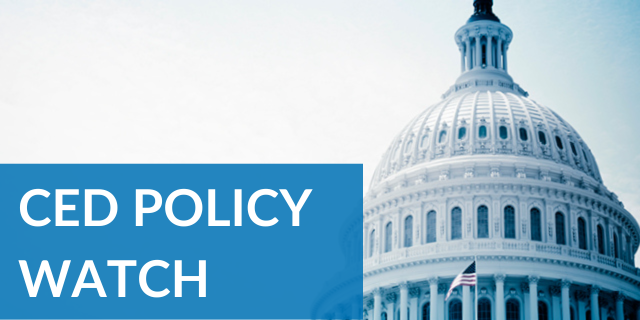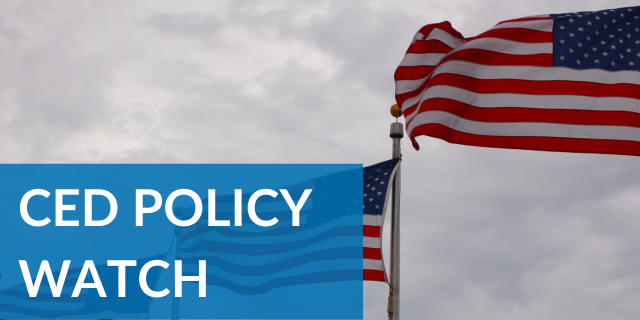Press Release
CED Issues Statement on Ensuring Safe, Accessible, Credible Elections
2022-11-04
Dr. Lori Esposito Murray, President of the Committee for Economic Development, the public policy center of The Conference Board (CED), released the following statement on the upcoming midterm elections:
The nation approaches the 2022 midterm elections in an uncertain state. While early voting is indicating a growing trend of participation seen in recent years, polls show that many Americans are losing confidence in the integrity of our elections. This loss of confidence, if left unaddressed by leaders in both the public and private sectors, poses significant dangers to the fabric of American democracy.
The Committee for Economic Development, the public policy center of The Conference Board (CED), has a long history of promoting credible, transparent, secure, competitive, and accessible elections. Earlier this year, CED released a Solutions Brief that underscored that these principles are the pillars of our democracy and fundamental to the confidence of US citizens in their government and its leadership. They are also essential to the long-term health of the US economy and to our leadership around the world.
There is still time to implement several of CED’s recommendations. We urgently call on state and local officials, members of Congress, and business leaders to take the following steps to promote election integrity and security:
Non-partisan/Bi-partisan administration of elections:
- Take steps to ensure that electoral administration remains non-partisan. Even in states where certain election supervisory positions are elected, non-partisan staffing and standards must remain in place. Where changes have been made that increase partisan control of election administration, they should be reversed.
- Widespread poll monitoring on a bipartisan basis—with trained, partisan observers from both sides participating at the same polling locations—should be implemented.
Safety and security of election administrators and polling places:
- Take steps to ensure that election administrators can conduct their jobs fairly and securely, without harassment, and that Federal laws against voter intimidation are enforced.
- Plan for the provision of sufficient physical and cyber security of election sites and infrastructure.
Employ credible audits and fortify cybersecurity:\
- Before Election Day, conduct rigorous testing, including for cybersecurity risks, of voting machines and other systems.
- All equipment in voting machines capable of connection to the internet should be disabled and rendered unusable, with a goal for 2024 that all wireless components should be prohibited in voting systems.
- Require reporting of cybersecurity incidents to law enforcement, including attacks on voting infrastructure.
- Conduct rigorous post-election audits of election systems on a nonpartisan basis
Devote sufficient time and resources to counting all ballots:
- Provide that mail-in ballots received before Election Day be counted beforehand, to speed the announcement of results.
- Establish and communicate clear guidelines regarding the processing and counting of absentee ballots and the handling of errors.
Ensure efficient in-person voting processes:
- Establish a sufficient number of voting machines, so that voters do not have to wait in long lines and can easily reach the polls.
- Ensure a sufficient number of provisional ballots are available at all precincts in case of challenges to a voter’s registration.
Business must play a role:
- Provide a leadership voice focusing on the importance of voting in elections.
- Communicate any new voting rules, options for voting, and voting procedures to employees and customers.
- Make it easier or more affordable for employees to serve as poll workers, providing paid leave to facilitate safe voting and reduced crowding at the polls.
To read the complete list of recommendations, please see CED’s Solutions Brief, Secure, Credible, Accessible Mid-Term Elections in 2022. Also see CED’s Op-Ed, Boost Election Integrity Now, by CED Trustees Bob Kueppers, Former Senior Partner, Global Regulatory & Public Policy Deloitte LLP, and Paula Stern, Former Chairwoman of the US International Trade Commission (ITC), and Founder & President of The Stern Group.
Media Contacts
adonovan@tcb.org; jdiblasi@tcb.org
About CED
The Committee for Economic Development (CED) is the public policy center of The Conference Board. The nonprofit, nonpartisan, business-led organization delivers well-researched analysis and reasoned solutions in the nation’s interest. CED Trustees are chief executive officers and key executives of leading US companies who bring their unique experience to address today’s pressing policy issues. Collectively they represent 30+ industries, over a trillion dollars in revenue, and over 4 million employees. www.ced.org
About The Conference Board
The Conference Board is the member-driven think tank that delivers Trusted Insights for What’s Ahead®. Founded in 1916, we are a non-partisan, not-for-profit entity holding 501 (c) (3) tax-exempt status in the United States. www.conference-board.org



.png)



